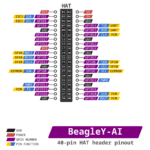
Happy New Year, everyone!  2024 was a fantastic year for my coding journey, and I’m thrilled to carry that energy into 2025.
2024 was a fantastic year for my coding journey, and I’m thrilled to carry that energy into 2025.
Let’s jump into the weekly updates and kick off another exciting year of coding adventures. 
BeagleBoard Rust Imager
A lot of work went into the BeagleBoard Rust Imager this week. I still haven’t figured out Macos completely, but at least other platforms are moving along well. At this point, I will probably release v1.0 without MacOS support since there is not much I can do about it.
CLI Improvements
Most of the past work concentrated on improving the GUI and making it as user-friendly as possible. However, as a terminal enjoyer, I prefer to use the CLI when possible. In lieu of that, I spent most of the past week bringing up the CLI to the point of being great to use, at least on Linux. Let us now go over some of the work:
Allow post-flash customization
The GUI has an option to perform some customization (e.g., setting user name and password, setting wifi ssid and password, etc.) after flashing the SD card. This ability in CLI would allow much easier automation when one needs to flash multiple devices. So, the CLI is now able to perform all the customization options available in the GUI.
Support for remote os images
Since it might be useful to be able to flash OS images from the internet, I ended up adding an option to flash remote OS images. I am a bit unsure regarding this one since one could just use wget, but it might end up being useful once I add an option to browse remote images using the default distros.json that the GUI uses.
Improved Help
One area that saw massive improvements is the help messages for the CLI (along with all the subcommands). It should be fairly simple for people to understand how to use the CLI now.
Shell Completion
The CLI now supports generating shell completions at both runtime and compile-time. I am using clap_complete to achieve this. The compile-time generation is done using xtask instead of build.rs, since it allows me to generate the completion on demand.
Manpage
I am also generating manpage(s) for the CLI and all of its subcommands at compile time using clap_mangen. Similar to shell completion, I am using xtask for this.
Xtask
While working on shell completion and manpage support, I came across cargo xtask spec, which allows adding free-form automation to a Rust project. It’s pretty neat since it does not need anything extra (other than cargo and rustc) and gives the power of full-fat Rust. It’s especially nice for cases like shell completion and manpage generation since they need to interact with Rust code and cannot be done with just Makefile recipe.
My current policy will be to use xtask when I need something that requires bash scripting but will stick to Makefile when just calling POSIX utilities is sufficient for the job. I have seen projects use xtask for CI, but I still prefer Makefile for that kind of functionality.
Showcase
Here are some showcases for the CLI.
Home Help
❯ bb-imager-cli --help
A streamlined tool for creating, flashing, and managing OS images for BeagleBoard devices.
Usage: bb-imager-cli [OPTIONS] <COMMAND>
Commands:
flash Command to flash an image to a specific destination
list-destinations Command to list available destinations for flashing based on the selected target
format Command to format SD Card
generate-completion Command to generate shell completion
help Print this message or the help of the given subcommand(s)
Options:
--quiet Suppress standard output messages for a quieter experience
-h, --help Print help
-V, --version Print version
Flashing SD Card Help
❯ bb-imager-cli flash sd --help
Flash an SD card with customizable settings for BeagleBoard devices
Usage: bb-imager-cli flash <DST> sd [OPTIONS]
Options:
--no-verify Disable checksum verification post-flash
--hostname <HOSTNAME> Set a custom hostname for the device (e.g., "beaglebone")
--timezone <TIMEZONE> Set the timezone for the device (e.g., "America/New_York")
--keymap <KEYMAP> Set the keyboard layout/keymap (e.g., "us" for the US layout)
--user-name <USER_NAME> Set a username for the default user. Requires `user_password`.
Required to enter GUI session due to regulatory requirements.
--user-password <USER_PASSWORD> Set a password for the default user. Requires `user_name`.
Required to enter GUI session due to regulatory requirements.
--wifi-ssid <WIFI_SSID> Configure a Wi-Fi SSID for network access. Requires `wifi_password`
--wifi-password <WIFI_PASSWORD> Set the password for the specified Wi-Fi SSID. Requires `wifi_ssid`
-h, --help Print help
Flashing Remote image
❯ bb-imager-cli flash --image-remote $IMG_URL --image-sha256 $IMG_SHA256 /dev/ttyACM0 bcf
[1] Preparing
[2] Verifying [█████████████████████████████████████████████████████████████████████████████████████████████████████████████] [100 %]
[3] Flashing [█████████████████████████████████████████████████████████████████████████████████████████████████████████████] [100 %]
[4] Verifying
Flashing Local image
❯ bb-imager-cli --quite flash $DESTINATION $IMG_PATH /dev/ttyACM0 bcf
GUI Improvements
While putting the GUI alongside the Raspberry Pi Imager, I observed that my GUI and its elements, like buttons, were a lot bigger. After some discussion, I ended up deciding to match the rpi-imager size. So, the default window size is now 680×450, with the buttons and other UI elements scaled down accordingly.
I also added some rounded corners since they look nicer in the scaled-down UI. The buttons and text are still a bit bigger than the RPI-imager, but since it fits fine, I am keeping it like this.
Home Screenshot

Future
I have been working on utilizing Gitlab issues as much as possible in the bb-imager-rs to make it easier for anyone wishing to start contributing. Hopefully, I can get some new contributors this way.
Ending Thoughts
That is all for the week. Hopefully, 2025 will be a good year for me and BeagleBoard.org. Look forward to next update.
Helpful links
The post This Week in Beagle #9 appeared first on BeagleBoard.

 2024 was a fantastic year for my coding journey, and I’m thrilled to carry that energy into 2025.
2024 was a fantastic year for my coding journey, and I’m thrilled to carry that energy into 2025.


 2024 marked as the year of AI with community-driven projects.
2024 marked as the year of AI with community-driven projects. Upcoming Pocket Beagle 2 features improved performance and connectivity.
Upcoming Pocket Beagle 2 features improved performance and connectivity. Exciting developments in Zephyr OS support for Beagle products.
Exciting developments in Zephyr OS support for Beagle products. Emphasis on documentation and mentorship for GSoC 2025.
Emphasis on documentation and mentorship for GSoC 2025. Discord community surpassed 2,000 members, showcasing engagement.
Discord community surpassed 2,000 members, showcasing engagement.



